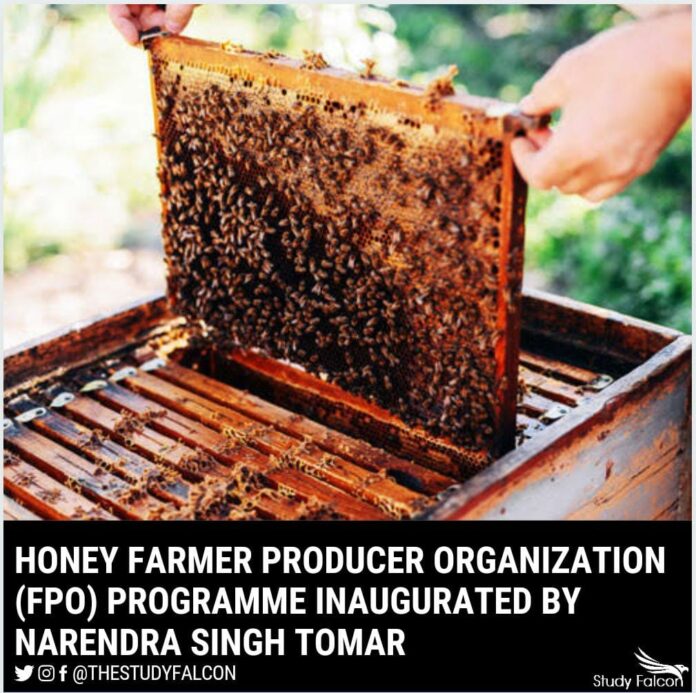Narendra Singh Tomar, the Minister of Agriculture and Farmers’ Welfare, virtually inaugurated the Honey Farmer Producer Organisation (FPO) Programme of the National Agricultural Cooperative Marketing Federation of India Limited (NAFED).
A Producer Organisation (PO) is a legal entity formed by primary producers, that are farmers, milk producers, fishermen, weavers, rural artisans, craftsmen, etc. Farmer Producer Organisation is a type of PO where the members are specifically farmers.
Under FPO, comes Apiculture or beekeeping which is the care and management of honey bees for the production of honey and wax. In this method, bees are bred commercially in apiaries, an area where a lot of beehives can be placed. The word ‘apiculture’ comes from the Latin word ‘apis’ meaning bee.
Due to various challenges in this field, this programme has been launched for the Formation and Promotion of FPOs. It is a relatively new Central Sector Scheme for the promotion of 10,000 new FPOs. The National Level Project Management Advisory and Fund Sanctioning Committee (N-PMAFSC) had allocated FPO clusters for 2020-21 to all implementing agencies.
Initially, there will be three implementing agencies to form and promote FPOs, namely Small Farmers Agri-business Consortium (SFAC), National Cooperative Development Corporation (NCDC) and National Bank for Agriculture and Rural Development (NABARD). NAFED has been appointed as the 4th national implementing agency.
States may also, nominate their implementing agency in consultation with the Department of Agriculture, Cooperation and Farmers’ Welfare (DAC&FW).
Specialist Cluster Based Business Organizations (CBBOs) engaged by implementing agencies will develop FPOs NAFED, through CBBOs and the Indian Society of Agribusiness Professionals (ISAP) has initiated the formation and promotion of FPOs of beekeepers and honey collectors in 5 states of India. These are East Champaran (Bihar), Morena (Madhya Pradesh), Bharatpur (Rajasthan), Mathura (Uttar Pradesh) and Sunderbans (West Bengal). The first Honey FPO was registered in the state of Madhya Pradesh under the National Beekeeping and Honey Mission (NBHM).
There are various benefits of this scheme which can help promote this sector.
- This will result in skill up gradation in scientific beekeeping. That is it would make farmers more efficient in understanding the nature of bees which an in turn be helpful in scientific research.
- State of the art infrastructural facilities will be provided for processing honey and allied beekeeping products like bee’s wax, royal jelly, bee venom, etc.
- Quality up gradation by quality control laboratories. FPO’s will provide a consolidated space through all the levels of product processing. This will prove helpful in making improved quality products and perform quality check.
- Better supply chain management by improving collection, storage, bottling and marketing centres.
- Promotion and Formation of FPOs is the first step for converting Krishi into Atmanirbhar Krishi.
There are several other efforts made by Government to Promote Beekeeping. Government’s main is to promote beekeeping as part of its aim to double farmers’ income and ensure tribal upliftment. The Government has allocated Rs. 500 crore towards beekeeping under the Atmanirbhar Abhiyan.
One such scheme is Apiary on Wheels, which is a unique concept designed by the Khadi and Village Industries Commission (KVIC) for the easy upkeep and migration of Bee Boxes having live Bee colonies.
The National Bee Board has created four modules to impart training as part of the NBHM. Under the training, 30 lakh farmers have been trained in beekeeping and are also being financially supported by the Government. Mini Mission 1 and Mini Mission 2 are schemes under the mission. The Government launched NBHM as part of ‘Sweet Revolution’. The ‘Sweet Revolution’ was launched in 2016 to promote beekeeping and associated activities.
The main objective of NBHM is to create an environment of holistic growth of beekeeping industry for income & employment generation, providing livelihood support to farm and non-farm households. It also aims at developing infrastructural facilities for multiplication of stock by bee breeders, setting up of disease diagnostic labs, beekeeping equipment manufacturing units. It also aims at empowering women through Beekeeping, and to maximise, economic, ecological and social benefits by diversification.
Due to the on-going pandemic, farmers have been drastically affected. Schemes like these would not only help producers but consumers as well. With better quality and monitored production, improved quality product will be made and supplied along with a systematic rate system. This will create transparency and also support the notion of good governance and Atmanirbhar Bharat.










